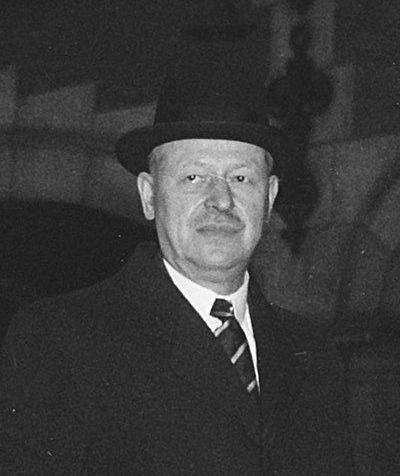1. Overview

Pierre Dupong (Pierre Dupongpjɛʁ dypɔFrench; November 1, 1885 - December 23, 1953) was a prominent Luxembourgish politician and statesman who served as the 16th prime minister of Luxembourg. His tenure as prime minister lasted for an extensive sixteen years, from November 5, 1937, until his death on December 23, 1953. Throughout his long career, Dupong held various ministerial portfolios, including finance, the army, agriculture, labour, and social matters. He was a foundational figure in Luxembourgish politics, being a founding member of the Party of the Right (PD) in 1914 and later establishing the Christian Social People's Party (CSV) as the main conservative party after World War II. His leadership was particularly critical during the Nazi German occupation, when he led the Luxembourgish government-in-exile.
2. Early Life and Background
Pierre Dupong was born on November 1, 1885. Details regarding his specific birthplace and early family background beyond his later political connections are not extensively documented in the available records.
3. Political Career
Pierre Dupong's political career was marked by his significant contributions to the establishment of major political parties and his long-standing leadership in various ministerial roles, culminating in an extensive period as Prime Minister during crucial national and international events.
3.1. Early Political Activities and Party Affiliation
Dupong entered the political arena as a founding member of the Party of the Right in 1914, a pivotal moment in Luxembourg's political development. He was subsequently elected to the legislature in 1915, marking the beginning of his legislative service. Following the end of the Second World War, Dupong played a crucial role in the post-war political landscape by founding the Christian Social People's Party (CSV), which emerged as the dominant conservative party in Luxembourg.
3.2. Ministerial Appointments
Before assuming the premiership, Pierre Dupong held several key ministerial positions. He served as the Director-General for Finance from 1926 to 1937, demonstrating his long-standing involvement in the nation's economic policy. Additionally, he was appointed Minister for Social Security and Labor from 1936 to 1937, highlighting his engagement with social welfare and labor affairs. Throughout his career, he was also responsible at different times for the ministries of finance, the army (defence), agriculture, labour, and social matters, showcasing his broad influence across various sectors of government. He held the position of Minister for Defence from 1937 to 1947 and again from 1948 to 1951.
3.3. Prime Ministerial Tenure
Pierre Dupong's tenure as Prime Minister began with the formation of the Dupong-Krier Ministry in 1937, which governed until 1940. His premiership was characterized by his leadership during one of Luxembourg's most challenging periods, including the Second World War and the subsequent post-war reconstruction.
3.3.1. Government-in-Exile during World War II
From 1940 to 1944, Dupong led the Luxembourgish government-in-exile after Luxembourg was occupied by Nazi Germany. He, along with the rest of the Luxembourg government and the Grand Ducal Family of Luxembourg, fled the country. Initially, they settled in France. While in Bordeaux in June 1940, they were granted transit visas by the Portuguese consul, Aristides de Sousa Mendes, which allowed them to continue their escape.
Dupong, accompanied by his wife Sophie and their children Marie Thérèse, Lambert Henri, Henriette, and Jean, followed the Grand Ducal family through Coimbra and Lisbon in Portugal. They initially settled at Praia das Maçãs after the Grand Ducal family relocated to Cascais. By August 1940, the entire entourage had moved to Monte Estoril. The Dupong couple resided at Chalet Posser de Andrade until September 26, 1940, while their children remained there until October 2, 1940. On September 26, 1940, Pierre and Sophie Dupong boarded the S.S. Excalibur bound for New York City, arriving on October 5, 1940. They were accompanied by Georgette and Betty Bech, the wife and daughter of Joseph Bech, who served as the Foreign Minister of the Luxembourg government-in-exile. During this period, the government-in-exile also operated from Montreal, Canada.
3.3.2. Post-War Governments
Following the liberation of Luxembourg, Pierre Dupong continued to play a central role in the country's governance. He presided over the Liberation Government, which oversaw the initial stages of national recovery. This was followed by the National Union Government, aimed at fostering national unity during the reconstruction phase. He subsequently led the Dupong-Schaus Ministry and the Dupong-Bodson Ministry, continuing to guide Luxembourg through the challenges of post-war stability and development.
3.4. International Engagements
Under Pierre Dupong's leadership, Luxembourg made a notable contribution to international efforts, particularly during the Korean War. He is recognized for the decision to send Luxembourgish soldiers to participate in the United Nations mission as part of the Belgian United Nations Command, demonstrating Luxembourg's commitment to international peace and security.
4. Personal Life
Pierre Dupong was married to Sophie. Together, they had several children, including Marie Thérèse, Lambert Henri, Henriette, and Jean. His son, Jean Dupong, followed in his father's footsteps and also pursued a political career, becoming a minister and a deputy for the Christian Social People's Party (CSV).
5. Death
Pierre Dupong passed away on December 23, 1953. He died while still serving as the Prime Minister of Luxembourg, bringing an end to his long and impactful political career.
6. Legacy and Impact
Pierre Dupong's legacy is defined by his remarkable sixteen-year tenure as Prime Minister, making him one of Luxembourg's longest-serving heads of government. His leadership provided stability during the tumultuous period of World War II, as he guided the government-in-exile, ensuring the continuity of Luxembourg's sovereignty. His efforts in founding the Party of the Right and later the Christian Social People's Party (CSV) solidified the conservative political landscape of the nation, shaping its multi-party democracy. Dupong's commitment to national reconstruction and international engagement, as evidenced by Luxembourg's participation in the Korean War, left a lasting impact on the country's political system, social policies, and its standing on the global stage.